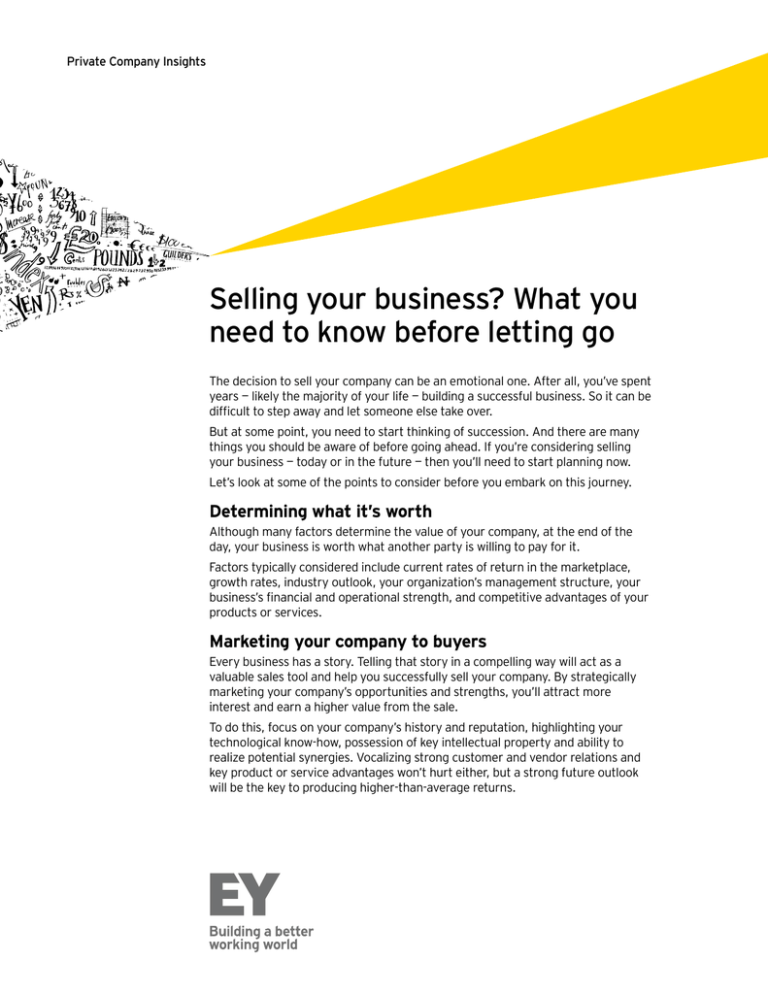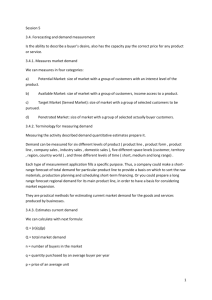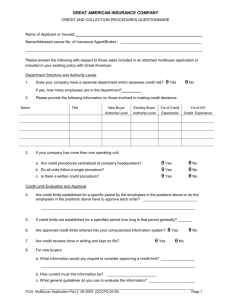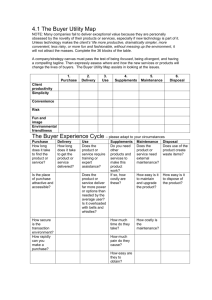
Private Company Insights
Selling your business? What you
need to know before letting go
The decision to sell your company can be an emotional one. After all, you’ve spent
years — likely the majority of your life — building a successful business. So it can be
difficult to step away and let someone else take over.
But at some point, you need to start thinking of succession. And there are many
things you should be aware of before going ahead. If you’re considering selling
your business — today or in the future — then you’ll need to start planning now.
Let’s look at some of the points to consider before you embark on this journey.
Determining what it’s worth
Although many factors determine the value of your company, at the end of the
day, your business is worth what another party is willing to pay for it.
Factors typically considered include current rates of return in the marketplace,
growth rates, industry outlook, your organization’s management structure, your
business’s financial and operational strength, and competitive advantages of your
products or services.
Marketing your company to buyers
Every business has a story. Telling that story in a compelling way will act as a
valuable sales tool and help you successfully sell your company. By strategically
marketing your company’s opportunities and strengths, you’ll attract more
interest and earn a higher value from the sale.
To do this, focus on your company’s history and reputation, highlighting your
technological know-how, possession of key intellectual property and ability to
realize potential synergies. Vocalizing strong customer and vendor relations and
key product or service advantages won’t hurt either, but a strong future outlook
will be the key to producing higher-than-average returns.
Selling your business? What you need to know before letting go (cont’d)
Do your due diligence
Considering potential buyers
A potential buyer will want to perform an extensive
investigation into your company before any transaction
occurs. You need to be prepared before contemplating a sale.
Organizations acquire businesses for several
different reasons.
In particular, you should ensure that all your financial
and legal information is organized, analyze trends your
company has seen in the past five years, and determine what
information can be shared to help the buyer make an informed
decision. A buyer may also want to review operations to help
develop plans and identify operational issues.
Figuring out the appropriate type of sale
There are many options available to you when selling your
company. Among the common types of transactions are asset
sales and share sales.
Although it’s a more complex transaction, an asset sale offers
more flexibility to the vendor and purchaser than a share sale.
However, a share sale can give the seller a lower tax rate on
the transaction and the option of transferring all liabilities to
the buyer. But if you’re going with an asset sale, be aware of
possible double taxation at the corporate and shareholder
levels, and a higher asking price.
If neither of these options appeals to you, then there is
another transaction option available: a hybrid sale. Hybrid
sales offer more comfort through security for the buyer and
continuity for the seller.
Even if a sale is not in your short- or medium-term plans,
structuring from the outset to facilitate a future business
sale can make the end game a lot easier and less costly.
When you’ve entered the marketing process, it’s too late for
many strategies.
A strategic buyer is looking for a business to establish or
realize synergies, while a financial buyer may or may not have
investments in your industry. The strategic buyer is looking to
grow and capitalize by integrating other businesses, while the
financial buyer acquires a company because the business (or
industry) is attractive and profitable. Other purchasers include
diversified groups and private individuals.
Regardless of your choice, there will be benefits and
downsides with any type of buyer, so you need to decide what
you want out of the sale before you make an informed choice.
Reviewing the process
Selling a business is a lot of work. To begin, you must first
select a process, either a targeted or a broad auction. You
then begin building a list of potential buyers to approach
during the sales process.
Then your focus turns to marketing to draw in and approach
interested buyers. When a potential buyer submits a letter of
intent, it’s then time to perform due diligence and solicit offers
before closing the sale.
Working with an advisor
It’s difficult to market your business if you don’t have a clear
plan. That’s where an advisor can step in, to help you weigh
the many options available and find one that is ideal for you.
Bringing valuable benefits and insights to the table, your
Ernst & Young advisor can guide you through the selling
process and help you determine the right approach to
effectively market your business and identify potential
buyers. Efficient and experienced advisors can also help you
facilitate diligence, negotiate offers, assist with closing and aid
with legalities.
What’s next?
Whether you’re selling your business tomorrow or sometime
down the road, it’s essential to start planning today. You have
multiple factors to consider, so it’s important to weigh the
pros and cons of each option before you go in to negotiate a
profitable sale.
For more information and guidance on planning for the future
of your business, contact your Ernst & Young advisor.◊
EY | Assurance | Tax | Transactions | Advisory
2
© 2013 Ernst & Young LLP. All Rights Reserved.
A member firm of Ernst & Young Global Limited.
1122956 ED 0114







